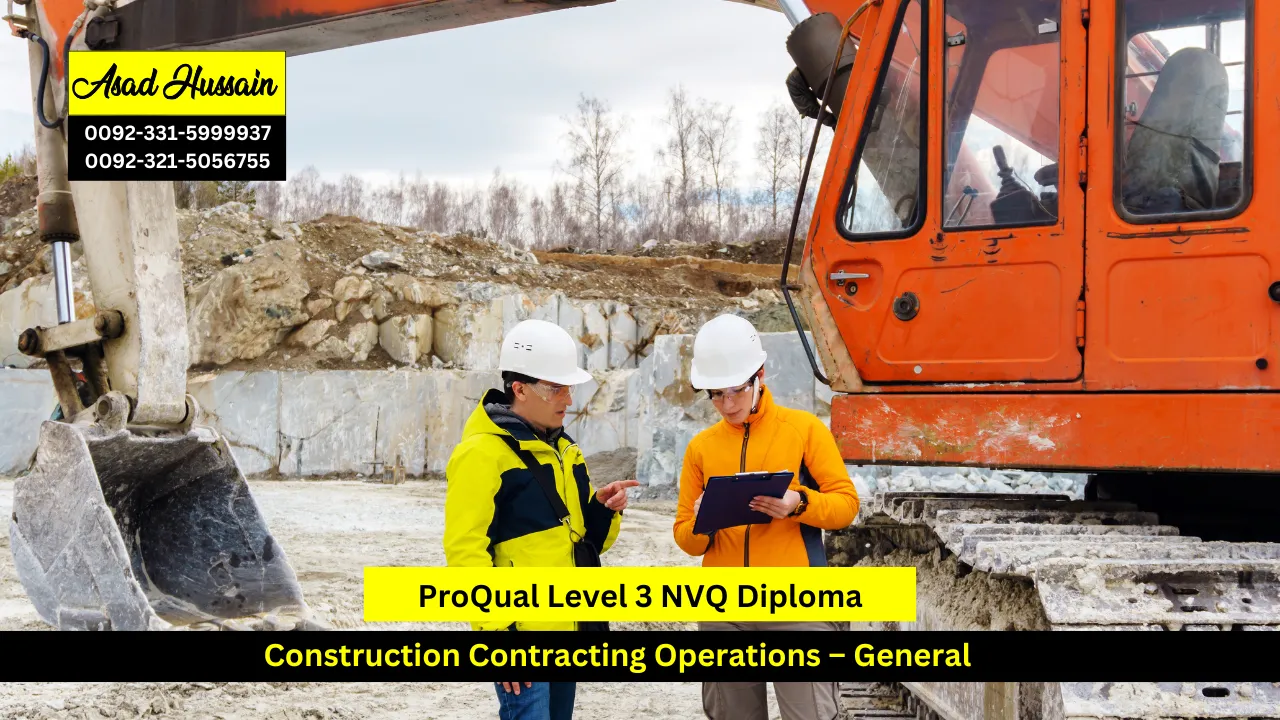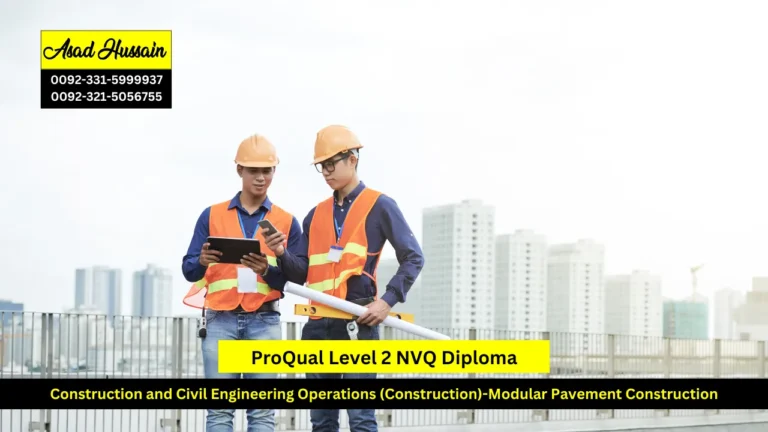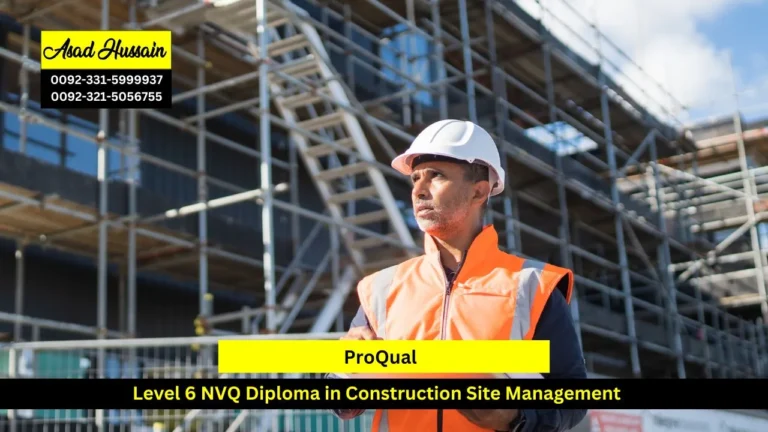This vocational qualification is tailored for skilled professionals who oversee and coordinate daily construction operations on site. It focuses on assessing and validating your practical competency in managing resources, processes, and teams to ensure projects are delivered safely, on time, and within specification. The ‘General’ pathway allows for a broad assessment of supervisory skills applicable across various construction environments, making it highly relevant for versatile site-based roles.
The course is centred on the National Occupational Standards and requires you to build a portfolio of evidence from your real-world work activities. Through this process, you will demonstrate your ability in key areas such as planning work programmes, controlling project progress, organising resources, and implementing health, safety, and quality procedures. This evidence-based model ensures the certification is a true reflection of your applied professional skills and on-the-job performance.
The ProQual Level 3 NVQ Diploma in Construction Contracting Operations – General serves to formally certify your broad supervisory expertise, enhancing your professional standing. Achieving this diploma confirms your capability to effectively manage construction operations, providing a recognised benchmark of your practical leadership and organisational skills within the industry. It is a valuable credential for proven practitioners in construction site supervision.
Program Highlights
Mandatory Units
- Operate health, safety and welfare systems in construction
- Prepare programmes and schedules of work in construction
- Operate project information systems in construction
- Develop and maintain working relationships and personal development in construction
- Optional Units –
- Prepare for, collect, analyse and present survey data in construction
- Record the condition of property in construction
- Prepare for work operations in construction
- Prepare for and carry out physical testing in construction
- Prepare proposals and obtain feedback for the provision of products and services in construction
- Prepare and process invitations to tender in construction
- Prepare estimates, bids and tenders in construction
- Monitor, maintain and improve supplies of materials in construction
- Recommend and monitor supplies of plant and equipment in construction
- Prepare drawings and schedules in construction
- Assess, plan and monitor project methods and progress in construction
- Prepare and monitor costs and accounts in construction
- Implement contract work in construction
- Establish and maintain the dimensional control of construction works
- Integrate and control project design information in construction
Entry Requirements
To enrol in the ProQual Level 3 NVQ Diploma in Construction Contracting Operations – General, candidates must satisfy the following essential conditions:
- Age & Status: Applicants must typically be at least 19 years old and must be employed in a relevant supervisory or technical role, as this qualification assesses competence through workplace evidence.
- Educational Background: There are no mandatory formal qualifications; however, prior learning such as a Level 2 NVQ in Construction, a City & Guilds craft certificate, or a related BTEC Diploma demonstrates beneficial foundational knowledge.
- Language Proficiency: Candidates must have a proficient level of English to understand assessment materials, compile a detailed portfolio of evidence, and communicate effectively with assessors and site teams.
- Work Experience: This is the fundamental requirement. Applicants must be in current employment where they are actively performing construction contracting operations at a supervisory or technical level to generate the necessary evidence for assessment.
Prospective learners are advised to have an initial discussion with a course advisor to review their current role and ensure it provides the scope needed to meet the assessment criteria for this work-based diploma.
Learning Outcomes
Operate health, safety and welfare systems in construction
- Identify and apply statutory health, safety, and welfare regulations.
- Implement risk assessment and control procedures.
- Promote a culture of safe working practices.
- Monitor and maintain compliance with safety systems.
Prepare programmes and schedules of work in construction
- Create logical and realistic work schedules for construction activities.
- Use planning tools to coordinate tasks and timelines.
- Identify critical path and manage resources effectively.
- Monitor progress and adjust schedules as necessary.
Operate project information systems in construction
- Use digital tools and software to manage project data.
- Organise, update, and retrieve project-related documents.
- Communicate project information accurately to stakeholders.
- Ensure information security and version control.
Develop and maintain working relationships and personal development in construction
- Build and sustain effective professional relationships.
- Apply communication and teamwork strategies.
- Reflect on personal performance and identify development goals.
- Participate in training and continuous professional improvement.
Prepare for, collect, analyse and present survey data in construction
- Plan and execute field surveys using appropriate techniques.
- Analyse survey data using standard industry practices.
- Produce accurate reports and visual presentations.
- Interpret data to support project decisions.
Record the condition of property in construction
- Conduct systematic property inspections.
- Identify structural and non-structural issues.
- Document property conditions with supporting evidence.
- Recommend appropriate maintenance or repairs.
Prepare for work operations in construction
- Organise and coordinate site preparation activities.
- Allocate resources and establish workflow plans.
- Communicate work instructions and roles clearly.
- Monitor the readiness of tools, materials, and personnel.
Prepare for and carry out physical testing in construction
- Identify the need for specific physical tests.
- Conduct tests following technical standards and protocols.
- Record and evaluate test results for accuracy and relevance.
- Use findings to inform construction practices.
Prepare proposals and obtain feedback for the provision of products and services in construction
- Develop comprehensive service/product proposals.
- Engage stakeholders for input and suggestions.
- Modify proposals based on constructive feedback.
- Present proposals persuasively and professionally.
Prepare and process invitations to tender in construction
- Draft clear and compliant tender documentation.
- Evaluate and select potential contractors or suppliers.
- Manage the tendering process and timelines.
- Ensure transparency and fairness in tender procedures.
Prepare estimates, bids and tenders in construction
- Analyse project specifications and drawings.
- Calculate accurate costs for labour, materials, and equipment.
- Develop competitive bids aligned with market standards.
- Present tenders in a structured and professional format.
Monitor, maintain and improve supplies of materials in construction
- Track material inventory and usage rates.
- Ensure timely procurement and delivery of supplies.
- Address shortages and delays effectively.
- Implement strategies to reduce waste and costs.
Recommend and monitor supplies of plant and equipment in construction
- Identify plant and equipment needs for specific tasks.
- Recommend suitable suppliers and equipment types.
- Oversee equipment allocation and usage.
- Maintain records and evaluate supplier performance.
Prepare drawings and schedules in construction
- Produce detailed technical drawings and specifications.
- Create timelines and schedules aligned with project stages.
- Coordinate drawings with design and construction teams.
- Use digital tools to manage revisions and updates.
Assess, plan and monitor project methods and progress in construction
- Evaluate proposed project methodologies for efficiency.
- Develop and implement detailed work plans.
- Monitor project milestones and productivity.
- Resolve deviations from the project plan.
Prepare and monitor costs and accounts in construction
- Develop cost plans and financial forecasts.
- Track actual expenditure against budgets.
- Identify variances and provide corrective measures.
- Produce financial reports and maintain compliance.
Implement contract work in construction
- Understand and interpret contract terms and conditions.
- Coordinate work activities in line with contractual obligations.
- Monitor performance against contract requirements.
- Resolve contractual issues and disputes.
Establish and maintain the dimensional control of construction works
- Apply measurement techniques to ensure design accuracy.
- Set out and verify site dimensions.
- Maintain control throughout the construction process.
- Record and report dimensional data.
Integrate and control project design information in construction
- Collect and coordinate design inputs from stakeholders.
- Manage version control and design documentation.
- Identify and resolve inconsistencies in design data.
- Support effective communication across design and site teams.
Target Audience
This qualification is designed for experienced construction professionals who hold broad supervisory or technical responsibilities across the daily operations of a construction site. It is ideal for individuals who coordinate various aspects of a project, from planning and resource management to quality and safety compliance, without specialising in a single function like design or buying. Specifically, it is for:
- General Site Supervisors and Assistant Site Managers overseeing overall on-site activities.
- Construction Supervisors and Section Foremen responsible for coordinating multiple trades and work areas.
- Site Agents and Works Managers in smaller to medium-sized projects.
- Experienced Tradespersons or Gangers who have progressed into a supervisory position with wide-ranging duties.
- Individuals seeking a comprehensive certification that validates their all-round capability in site management and operations.
In essence, this NVQ recognises the competency of versatile professionals who ensure the smooth, efficient, and safe execution of construction projects through effective planning, organisation, and leadership on site.







